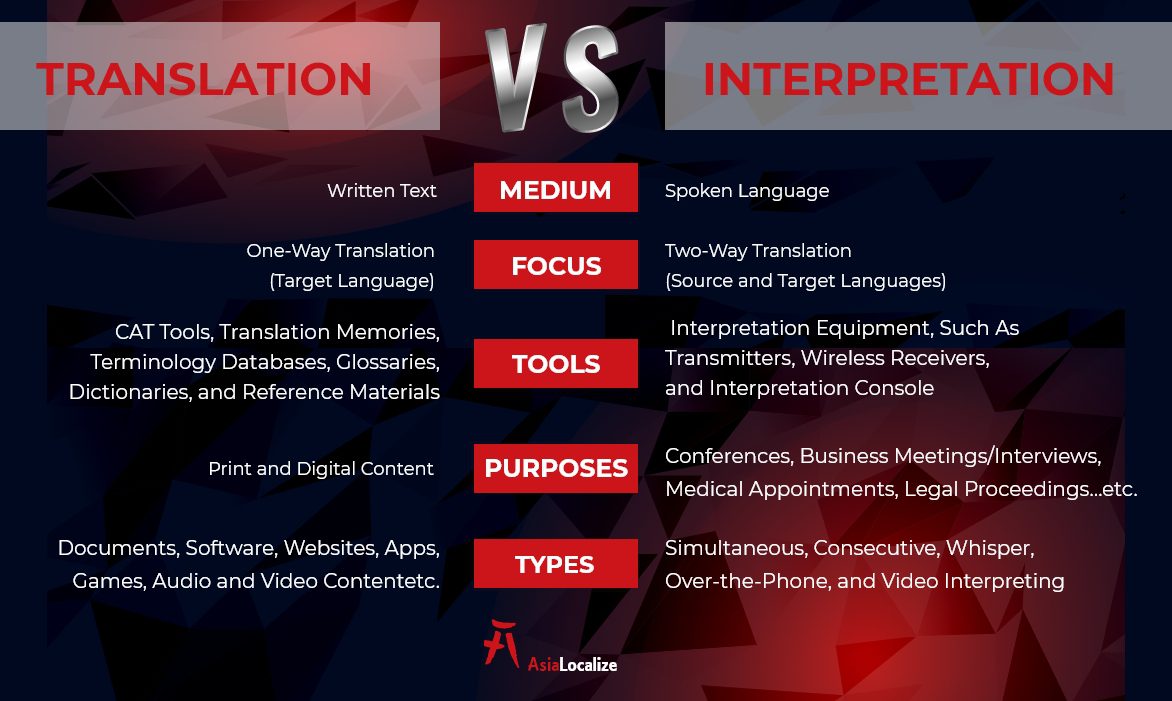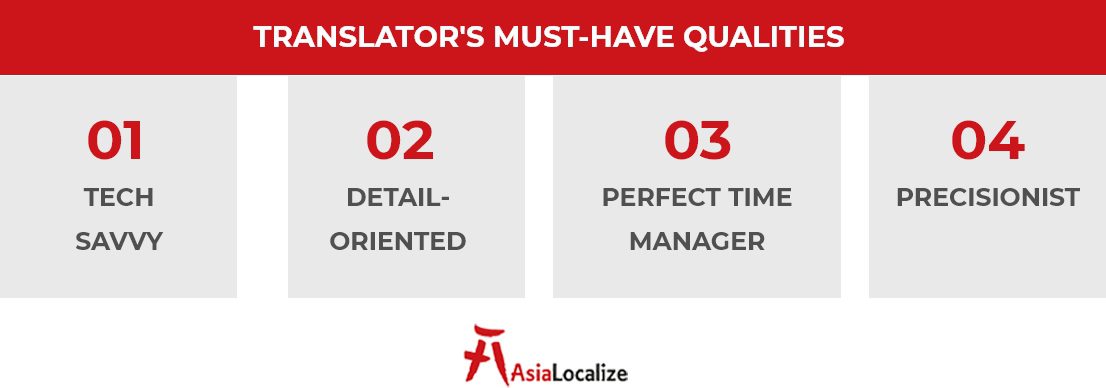
What Is the Difference Between Translation and Interpretation?
Many people confuse translation with interpretation, although they’re different linguistic disciplines. So, what is the difference between translation and interpretation?
To choose the exemplary service for your business, you have to know that translation and interpretation are two different concepts. You may think that the only difference is the medium of delivery, but it goes far beyond just that. They require special skills, training, and even linguistic ability and knowledge, and it’s unlikely that one can do both professions with the same efficiency. But most of all, they both serve different purposes in different contexts.
Deciding whether to go with translation or interpretation isn’t as easy as you may think. And you don’t want to end up paying for the wrong service. So here comes this post to help you delve into the two worlds and make the right decision.
In this post, we will discuss the differences between translation and interpretation. We’ll help you navigate all you need to know about both disciplines, covering their definition, importance, differences, and translators’ and interpreters’ skills.
Table of Contents
Translation vs. Interpretation
Before we give you an exact answer to “what is the difference between translation and interpretation?”, you should get to know the definition of them both to start on the right foot.
What Is Translation?
Translation is a language service that transfers the meaning of a written text from one language to another so it can be understood by the target audience. From technical documents and audiovisual content to websites, apps, and games, translation only deals with any written form of content.
That’s why a translator’s native language should be the target language, because it’s language fluency and cultural competence that make translators able to deliver a translation that’s faithful, flawless, and natural-sounding to the target locale.
Also, subject-matter expertise and a deep understanding of the industry involved, its practices, and terminology is crucial to achieving accurate translations that serve their purpose well in a specific context.
Here translators use some help from computer-based tools, such as translation memory, which stores previously translated segments from different projects, helping translators work faster and more efficiently, while also ensuring accurate, consistent translations. They also use dictionaries, reference materials, and more to produce professional translations that are precise and detail-oriented.
What Is Interpretation?
On the flip side, interpretation deals with the spoken language. It’s an oral form of translation, where interpreters convey speech from one language to another or, in some cases, communicate in sign language.
Have you ever seen an interpreter carrying a dictionary in a large conference or asking a speaker in a business meeting to pause to look up the dictionary for a meaning of a word? Absolutely not.
Due to the nature of the job, it’s unlikely for an interpreter to use the tools that a translator can use. Instead, interpreters only depend on their experience, linguistic skills, listening memory, and quick reflexes. Interpreting occurs in conferences, business meetings, medical appointments, live TV coverages, legal proceedings, etc.
The Importance Of Translation And Interpretation
This is only a glimpse into the question what is the difference between translation and interpretation. Before we expand on the answer, let’s explore the importance of both. So, “Why do you need translation and interpretation?”
Globalization has opened the way for an interconnected world. Communications, business, and entertainment have gone global. News, books, films, and even matches are broadcast in many languages to be shared worldwide with international audiences.
Most importantly, presently, there is a high demand for businesses to expand their products and services into new markets, creating a new dimension to a united globe with the same capabilities and power. It will never be possible to unite a world without breaking the linguistic and cultural barriers. And here comes the role of translation and interpretation.
They not only have given us the chance to embrace different arts, tastes, and cultures. It has also helped businesses compete and grow in foreign markets, which has provided consumers with a large variety of choices and businesses with new revenue streams.
Translation efforts have been incorporated into our daily life. For example, check your shampoo, medicines, or electronics at your home! You will find that your life won’t be the same if businesses decide to stay local without any expansion intentions, which contributes to the rise and need for translation and interpreting services.
And Coronavirus impact shouldn’t be forgotten. It’s necessary now that medical information crosses all the borders to be spread worldwide. And even all governments nowadays utilize translation services to keep their citizens up to date with the latest public advisories. As to the interpretation services after the crisis of Covid-19, remote and over-the-phone interpretation services have thrived tremendously after the outbreak to reach $1.2 billion in 2019. And the demand for interpreters skyrocketed to support foreigners, and particularly immigrants, getting proper medical care.



A Checklist of Interpreters & Translators
Must-Have Traits and Skills!
The skills that you have to seek in your interpreter or translator.
What Is the Difference Between Translation And Interpretation?
Now that you have a basic idea about the meaning and importance of both disciplines, we have come to the long-waited point, where we give a more specific answer to the question “what is the difference between translation and interpretation?” Here are the main differences between translation and interpretation:


Translation: It focuses on the languages’ written form, such as documents, websites, apps, and games
Interpretation: It focuses on the spoken language and oral communications in live settings, such as conferences and meetings.
Translation: It takes place after providing the source text, where translators draw on their expertise and leverage advanced translation tools to translate and convey the content from one language to another. They, then, perform multiple review and proofreading rounds to deliver a translation that is 100% free of errors.
Interpretation: There are many types of interpretation, most importantly simultaneous and consecutive interpreting. As their names suggest, in simultaneous interpreting, the interpreter converts a speech in real-time, i.e. at the same time the speaker is giving the speech, while in consecutive, the interpreter translates after the speaker finishes.
Translation: The translator should necessarily translate into his mother tongue and have a high level of source language proficiency.
Interpretation: Interpreters’ work is two-sided, translating from and to the source language. So, it’s crucial that the interpreter possess a high level of proficiency in both the source and target languages.
Translation: Translators can use as much material as they want, whether they are dictionaries, reference guides, or translation support tools.
Interpretation: Interpreters can prepare prior to any event, but this doesn’t guarantee the outcome’s success if they don’t possess a present mind, since interpreting is all about reacting on the spot.
Translation: High-quality translations are powered by skilled linguists with extensive professional experience who follow and stick to translation best practices. And despite the need for fast translations in our fast-paced world, time is on the translator’s side, unlike the immediacy nature of interpretation.
Interpretation: Time isn’t in favor of interpreters as they’re supposed to work on the spot. So, to provide reliable interpreting services, the presence of an interpreter with expert knowledge is a must.
What Are the Translator’s Much-Needed Skills?
Primarily, translators translate solely to their native language, not back into the source language. In other words, they can’t play with the source language words as their own mother tongue. That’s why it’s crucial to go for a language translation services provider that works with native linguists.
A good translator is one who can deliver the source language’s meaning in the most appropriate and natural way to the target audience. So, cultural competence is equally important as language fluency. Moreover, when dealing with a specific industry, the translators should have specialized expertise in that industry in question to deliver translations that are relevant, impactful, and tailored for your industry.
Also, adept translators know how to deal with the challenges of industry-specific terminology, metaphors, idioms, analogies, and colloquialisms and find a well-suited equivalent in the target language. Here are some of the personal traits and skills that any translator should have in order to provide you with first-rate translation services:


.Tech Savvy: Translators should be able to work using advanced technologies, such as CAT tools, which help a lot in delivering fast and accurate translation solutions.
.Detail-Oriented: One of the most important traits that a translator should have is the ability to pay extraordinary attention to detail. Nothing should be lost between the lines, and every piece of information should be conveyed in the target language faithfully without missing any point.
.Perfect Time Manager: Although we said before that time is on the translator’s side compared to the interpreter, that doesn’t mean that there are no time constraints, especially in industries such as medicine or legal sectors. Deadlines should be taken seriously, and accordingly, translators should have time management skills by which they can provide the required translations in the fastest turnarounds.
.Precisionist: A great translator should strive for perfection when translating any text to produce the best version. Precision makes the difference between a good translation and great translation.
What Are the Interpreter’s Much-Needed Skills?
Interpreters should be well versed in the target and source languages since they jump back and forth between both languages to deliver clear two-way communications. When interpreting, interpreters must have multi-tasking skills since they must simultaneously listen and speak. In the span of seconds, the interpreter should listen to the speaker’s words and understand, process, and memorize the information to convey them to the listener in a relevant manner. Here are the traits that the interpreters should have to produce interpreting services of the highest standards:


.High-Tech Savvy: Interpreters should know how to use interpretation technologies, including both on-site and remote technologies.
.Attentive: As mentioned before, the interpreter should listen and talk at the same time. Even the slightest distraction can cause real problems. Consequently, interpreters must have exceptional listening and memory skills to do the job efficiently.
.Communicative: One of the essential qualities that the interpreter should have. What can knowledge do if interpreters can’t speak their minds?
.Quick Responder: An interpreter should respond fast to any surprises during the live event to avoid any delay that may cause miscommunications or misunderstandings.
Now, you get the difference between translation and interpretation. You are capable of choosing the right service for your project and your business. And also, now you have the ability to recognize professional interpreters and translators to ensure professional multilingual communications.



Maximize your impact with AsiaLocalize’s translation
and interpreting services!

